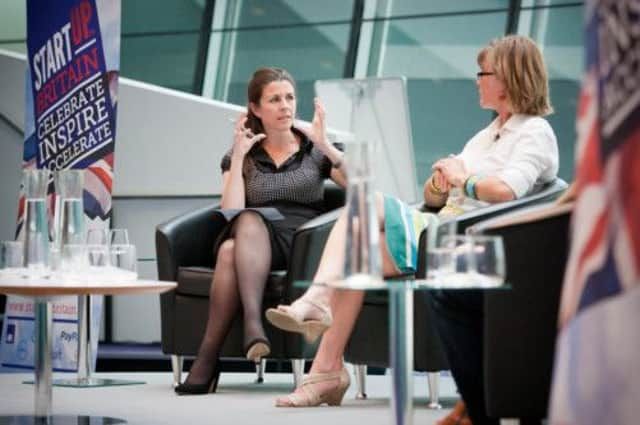Interview: Emma Jones on start-ups


This was the case even in the days before she launched her own community and support network for start-ups and home workers, Enterprise Nation.
More recently, she has become a leading light in the self-employment movement with the creation of the UK government-backed campaign to encourage people to embark on their own businesses: Start Up Britain.
Advertisement
Hide AdAdvertisement
Hide AdOn Friday, the initiative’s battle bus was in Edinburgh to provide a one-stop place for anyone who is tempted to be their own boss – or perhaps who are unable to find a job. Last year, 484,211 people started their own businesses and this year Jones reckons the number will surpass 500,000.
Start-Up Britain has many strands, including Pop-Up Britain, an effort to establish temporary retail stands in empty shops. Last week the campaign opened a flagship pop-up shop on London’s Piccadilly after Jones persuaded the landlord, the Crown Estate, to let them take space on flexible terms at its recently-completed St James’s Gateway development. One of the next target cities is Edinburgh, says Jones.
Another arm of Start-Up Britain is the PitchUp, a venture with retailer John Lewis. Until 18 August, entrepreneurs in Scotland are invited to submit ideas for products that will be sold on the department store chain’s shelves.
Increasingly, so many people are taking up self-employment it is hard not to get enthused by Jones’s evangelism.
She says: “When I’m asked why people like becoming their own boss, I say because it provides the freedom and flexibility that comes with choosing how you work, where you work, what you wear when you work – it is all of that and not having to go into an office every day and be told what to do.”
Jones knows of what she speaks, having set up her business empire from her home in Shrewsbury.
It began when she gave up a safe but dull job at accountancy firm Arthur Andersen in 2002. She felt bean-counting was never going to fulfil her, so left to set up Techlocate, which specialised in advising inward investment agencies in the UK on how to target high-growth companies with international ambitions. A few years later, she sold it.
Setting up Enterprise Nation in 2006 seemed an unusual step, but she has since published a number of books aimed at her target market, with titles including Turn Your Talent into a Business: A Guide to Earning a Living from Your Hobby and Spare Room Start-Up: How to Start a Business from Home. Through these efforts, and the establishment of Enterprise Nation as a lobbying group, Jones has arguably become the voice in the UK of one-man-bands. Or as she prefers to call them, “free agents”.
Advertisement
Hide AdAdvertisement
Hide AdThat term comes from an early guru of the freelance brigade, US-based Daniel Pink, who set it all out in a book called Free Agent Nation. Jones had introduced the author to the UK, having invited him to speak about his vision of a world where individuals work for themselves, striking up business schemes with other free agents, organising themselves not unlike a swarm, converging and moving together and then breaking apart just as quickly.
Although Pink’s book was published more than ten years ago, it is now eerily prescient. As Jones says: “It still stands true today.”
She describes how recently she led a group of 20 start-up entrepreneurs to No 10 Downing Street to brief a special adviser on how one-man-bands contribute to the economy. The first misconception they had to allay was that success for these new firms was not about taking on employees – at least, not at first.
Jones says: “The first 30 minutes we spent on the fact that the way businesses were growing was through outsourcing and subcontracting to other freelancers as opposed to hiring people.
“I bet if I look back to Free Agent Nation there will be a chapter that talks about the way in which these free agents grow by partnering with other free agents to deliver projects, then going on and finding the next gig. That is what is happening now and that is how small businesses are growing. It massively inspired me because I thought, ‘Crikey this is going to happen in the UK’.”
In the meantime, home computers have given individuals tools that ten or 15 years ago were only available to large corporations. “All of those factors have come into play before that vision became reality, but that is what we are looking at now,” she says.
But she admits there are downsides. Last week, she was in Newcastle-upon-Tyne at a “Start Up Saturday” event run by Enterprise Nation.
“A woman came up to me at the end and asked what would become of her if she became long-term sick while she was self-employed. I said, ‘Well, really sorry, but you can’t afford to become long-term sick. You won’t get any payment.’ There is no regular salary, no sick pay, no maternity leave. They are the things you give up. This is the call that people are making.
Advertisement
Hide AdAdvertisement
Hide Ad“Are they prepared to give that up in order to get the freedom that comes with their working conditions? That is a really personal choice, whether you are prepared to give one up for the other. But if you could have both, it is even better.”